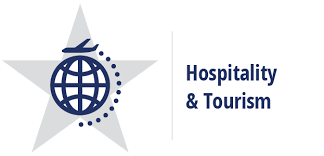Hospitality and Tourism
Hospitality and Tourism courses cover a wide range of topics aimed at preparing students for careers in the hospitality, travel, and tourism industries. These fields involve customer service, event planning, management, marketing, and more. Below are details of the typical courses and topics offered in Hospitality and Tourism programs:
1. Introduction to Hospitality and Tourism
- Overview: Provides a broad understanding of the hospitality and tourism industries.
- Topics: History, trends, types of establishments (hotels, resorts, airlines, etc.), and basic terminology.
- Objective: Familiarize students with the scope and scale of the industries.
2. Hospitality Management
- Overview: Focuses on the principles and practices of managing hospitality businesses such as hotels, restaurants, resorts, and cruise lines.
- Topics: Hotel operations, human resources, financial management, and customer service.
- Objective: Equip students with managerial skills in various hospitality sectors.
3. Tourism Management
- Overview: Deals with managing tourism-related activities such as tour companies, travel agencies, and destinations.
- Topics: Destination management, tourism planning, sustainability in tourism, and marketing.
- Objective: Develop a comprehensive understanding of tourism planning and management.
4. Event Planning and Management
- Overview: Teaches the skills required to organize and manage events like weddings, corporate conferences, and large festivals.
- Topics: Event coordination, budgeting, logistics, vendor management, and marketing.
- Objective: Prepare students to execute successful events in various settings.
5. Marketing for Hospitality and Tourism
- Overview: Focuses on the strategies used to market hospitality and tourism products and services.
- Topics: Digital marketing, advertising, branding, customer relations, and market segmentation.
- Objective: Provide insights into promotional tactics and how to appeal to diverse tourist markets.
6. Customer Service in Hospitality
- Overview: Focuses on providing excellent customer service in hospitality settings.
- Topics: Communication skills, handling complaints, exceeding customer expectations, and building loyalty.
- Objective: Enhance students' ability to manage customer interactions effectively.
7. Food and Beverage Management
- Overview: Teaches students the skills required to manage food service operations within hotels, restaurants, and resorts.
- Topics: Menu planning, inventory control, cost management, food safety, and service styles.
- Objective: Prepare students to manage food and beverage operations effectively.
8. Tourism Economics
- Overview: Explores the economic aspects of the tourism industry.
- Topics: Economic impact of tourism, tourism demand forecasting, pricing strategies, and international tourism markets.
- Objective: Provide a deep understanding of the economic forces shaping tourism.
9. Sustainable Tourism
- Overview: Explores sustainable practices in tourism to minimize environmental impact while promoting economic and social benefits.
- Topics: Eco-tourism, community-based tourism, sustainable destination management, and conservation efforts.
- Objective: Teach students to incorporate sustainability into tourism practices.
10. Tourism Law and Ethics
- Overview: Covers the legal and ethical issues in hospitality and tourism.
- Topics: Contracts, liability, insurance, ethical standards, and human rights in tourism.
- Objective: Provide students with an understanding of the legal responsibilities and ethical issues they may encounter.
11. Global Tourism and Cultural Diversity
- Overview: Explores how global tourism trends and cultural diversity affect tourism operations.
- Topics: Cultural sensitivity, international tourism trends, and tourism in different cultural contexts.
- Objective: Equip students with the ability to work in diverse and multicultural environments.
12. Tourism Technology
- Overview: Focuses on the technologies shaping modern tourism and hospitality industries.
- Topics: Online booking systems, customer relationship management (CRM), virtual reality in tourism, and social media strategies.
- Objective: Introduce students to emerging technologies used in the tourism sector.
13. Internship/Practical Experience
- Overview: Many programs offer internships or practical work experiences to students.
- Objective: Provide hands-on experience in real-world hospitality and tourism environments, helping students apply classroom knowledge.
14. Tour Guide Training
- Overview: Focuses on the skills required to be a professional tour guide.
- Topics: Communication skills, storytelling, historical and cultural knowledge, and customer service.
- Objective: Prepare students to provide insightful and engaging tours.
15. Cruise and Resort Management
- Overview: A specialized course focusing on managing cruise ships and resort operations.
- Topics: Cruise itineraries, onboard services, resort activities, and guest experience management.
- Objective: Train students to work in the rapidly growing cruise and resort sectors.
Degree Levels:
- Associate Degrees (2 years): Typically cover foundational aspects of hospitality and tourism, preparing students for entry-level positions.
- Bachelor’s Degrees (3-4 years): Offers more in-depth knowledge and managerial skills, suitable for supervisory roles.
- Master’s Degrees (1-2 years): Advanced study in specialized areas of hospitality and tourism management, often for those aiming for higher-level leadership roles.
- Certifications: Shorter programs focusing on specific aspects like customer service, event management, or hospitality marketing.
Career Opportunities:
Graduates of Hospitality and Tourism programs can pursue careers such as:
- Hotel Manager
- Event Planner
- Travel Consultant
- Restaurant Manager
- Tour Operator
- Tourism Marketing Manager
- Cruise Director
- Resort Manager
- Destination Manager
Each of these courses offers valuable skills and knowledge to those interested in a career in the global hospitality and tourism industries.


